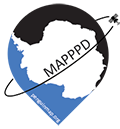
MAPPPD (Mapping Application for Penguin Populations and Projected Dynamics) is an open access decision support tool created and curated by Oceanites, an NGO dedicated to counting penguins in Antarctica. It links directly to the Antarctic Penguin Biogeography Project database and allows Antarctic enthusiasts and stakeholders to explore and download the most up-to-date publicly available penguin census records for the entirety of the white continent.

We are proud to announce that the Antarctic Penguin Biogeography Project (APBP) was awarded a 2024 Geo For Good award from Google!
Who are we?
MAPPPD is the product of an international collaboration of Antarctic researchers collecting data to study how this fragile polar ecosystem is changing through time.

Dr Heather Lynch
Co-lead APBP

Dr Christian Che-Castaldo
Co-lead APBP

Dr Grant Humphries
MAPPPD lead










